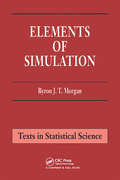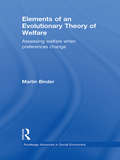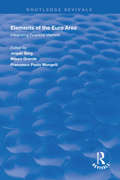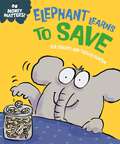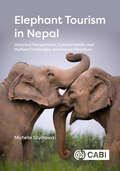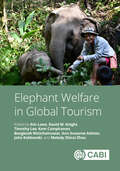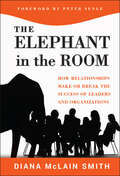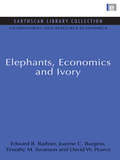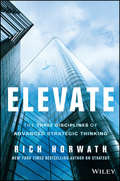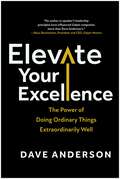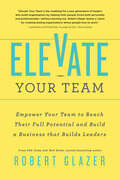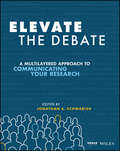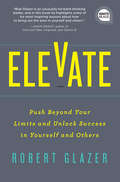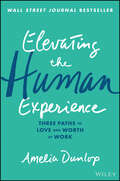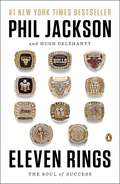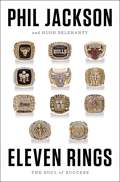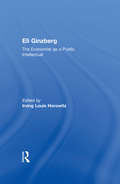- Table View
- List View
Elements of Simulation (Chapman And Hall/crc Texts In Statistical Science Ser. #4)
by Byron J.T. MorganThe use of simulation in statistics dates from the start of the 20th century, coinciding with the beginnings of radio broadcasting and the invention of television. Just as radio and television are now commonplace in our everyday lives, simulation methods are now widely used throughout the many branches of statistics, as can be readily appreciated from reading Chapters 1 and 9. The book has grown out of a fifteen-hour lecture course given to third-year mathematics undergraduates at the University of Kent, and it could be used either as an undergraduate or a postgraduate text. Simulation may either be taught as an operational research tool in its own right, or as a mathematical method which cements together different parts of statistics and which may be used in a variety of lecture courses. In the last three chapters indications are made of the varied uses of simulation throughout statistics. Alternatively, simulation may be used to motivate subjects such as the teaching of distribution theory and the manipulation of random variables, and Chapters 4 and 5 especially will hopefully be useful in this respect.
Elements of an Evolutionary Theory of Welfare: Assessing Welfare When Preferences Change (Routledge Advances in Social Economics)
by Martin BinderIt has always been an important task of economics to assess individual and social welfare. The traditional approach has assumed that the measuring rod for welfare is the satisfaction of the individual’s given and unchanging preferences, but recent work in behavioural economics has called this into question by pointing out the inconsistencies and context-dependencies of human behaviour. When preferences are no longer consistent, we have to ask whether a different measure for individual welfare can, and should, be found. This book goes beyond the level of preference and instead considers whether a hedonistic view of welfare represents a viable alternative, and what its normative implications are. Offering a welfare theory with stronger behavioural and evolutionary foundations, Binder follows a naturalistic methodology to examine the foundations of welfare, connecting the concept with a dynamic theory of preference learning, and providing a more realistic account of human behaviour. This book will be of interest to researchers and those working in the fields of welfare economics, behavioural and evolutionary economics.
Elements of the Euro Area: Integrating Financial Markets (Routledge Revivals)
by Francesco Paolo Mongelli Mauro Grande Jesper BergFirst published in 2005, this volume considers that, as time elapses since the introduction of the Euro, it is legitimate to start asking what impact the new currency and the single monetary policy have had on European integration. This book provides the most comprehensive review of financial integration in the euro area. The volume includes an introduction to the institutional features of the euro area and the literature on financial integration. It examines developments in the financial structures at large and moves forward to focus on specific areas pertaining to financial intermediaries, the bond and equity markets, and market-based debt finance. It is particularly suited to researchers and students of developments in the euro area, central banking, money and banking, as well as international relations and international business more generally. While the introductory chapters will help in bringing undergraduates on board, the later chapters will particularly benefit the early graduate student as well as the professional observer.
Elephant Learns to Save (Money Matters)
by Sue GravesElephant Learns to Save offers a gentle introduction to the concept of saving money for young children.This funny, charming story is the perfect way to introduce young children to the benefit of saving up for something they want to buy. Also included are suggestions for activities and ideas to talk through together to help children understand the concept.Elephant's old bike is too small for him, and he really wants to buy a bigger one. But bikes cost lots of money, and Elephant likes spending his pocket money on sweets and comics. Gran teaches him ways to save his money.The Money Matters series of picture books provide a gentle means of promoting concepts of money management, boosting self-esteem and reinforcing good behaviour. Supports the Personal, Social and Emotional Development Area of Learning in the Early Years Foundation Stage, and is also suitable for use with children in KS1 and can be used to discuss citizenship and values. Suitable for children under 5.
Elephant Tourism in Nepal: Historical Perspectives, Current Health and Welfare Challenges, and Future Directions
by Dr Michelle SzydlowskiA study of elephant tourism in Nepal from its origins in the 1960s to the present day, this book examines the challenges faced by captive elephants. Used as human conveyance, on anti-poaching patrol teams, as rescue vehicles, and in forestry service, elephants have worked with and for humans for hundreds of years. However, the use of elephants in tourism is a fairly new development within Nepal. Because the health and welfare of tourism elephants is vital to the conservation of wild individuals, this book offers an assessment of captive elephant needs and an examination of their existing welfare statuses. Numerous NGOS and INGOs are now active in elephant lives, and numerous advocacy organizations have arisen with the goal of changing tourism practices and improving captive elephant welfare. This book seeks to examine the motivations of these NGOs and INGOs, and to consider their ethical approaches to elephant health and welfare. Are the motivations of these organizations similar enough to work together towards a common goal, or are their ethical norms so different that they get in one another's way? Using an ordinary language and ethics framework, this text aims to identify the norms of cultures and organisations and reframe them in ways which may allow for more successful interactions.
Elephant Welfare in Global Tourism
At the centre of the elephant tourism industry lie two profound challenges: the delicate balance between income and compassion, and the severe threats to the survival of all remaining elephant species. Trained elephants exchange hands for staggering sums, reaching up to $100,000 each, yet the colossal appetites of the herds, with each elephant devouring over 100 kilograms of sustenance daily, pose formidable economic challenges for camp owners. An elephant camp's revenue is dependent on tourism, with a complex web of specialist businesses, local and international, large and small, contracted to recruit and enable visitors. This results in competition focused mainly on price and profitability considerations. The inadequacies of these business networks and of the administrative controls within which they operate were demonstrated during the complete shutdown of elephant tourism venues in early 2020 due to COVID-19. This authoritative text analyses elephants' vulnerabilities, providing an inspiring call to action for a more compassionate coexistence between elephants and the stakeholders responsible for their individual and herd welfare and survival. Elephant Welfare in Global Tourism is intended for managers, professionals and administrators of elephant camps, refuges and rescue centres, and for NGOs providing advice and support. Academic researchers on wildlife may find inspiration for suitable topics, and examples of current methodologies.
Elephant in the Room
by Peter Senge Diana Mclain SmithA systematic look at how relationships determine the success of leaders and their enterprises, along with tools to help strengthen and change themSince time immemorial, relationships have determined the fate of leaders. But today they are more critical to success than ever. No longer can leaders count on long time horizons or sloppy competition to make up for the inefficiencies that poor relationships create. Leaders must make decisions and take actions quickly and well with others, even those with whom they share very little?perhaps not even a time zone. This new world puts relationships at the center of what leaders must understand and master to succeed. Uses in-depth observational studies and clinical research to explore how relationships at the top of organizations work, develop, and changeShows how to understand, strengthen, and transform these relationships, so they can withstand the most intense pressures and conflictsThis important book features a Foreword by Peter Senge, author of The Fifth Discipline.
Elephants, Economics and Ivory: Elephants, Economics And Ivory (Environmental and Resource Economics Set)
by Edward B. Barbier Joanne C. Burgess Timothy M. Swanson David W. PearceIvory is big business, and in some parts of Africa elephants have been hunted almost to extinction in the quest for it. The losses to African economies have been catastrophic. Now there is an international ban on the trade and conservation is. the principal goal. This should be a matter for rejoicing, but nothing is quite so simple. The authors of this book have looked at the overall statistics, including those for countries where the elephant population is stable. They have considered the multiplicity of economic and social functions fulfilled by ensuring that elephant herds survive, tourism, a variety of ecological purpose. and, finally, as a source of ivory. They show how the careful management of elephants as a resource can best serve African interests. This book is at the cutting edge of economic thinking and provides a model for the consideration of the difficult relationship between people and wildlife. Originally published in 19990
Elevate
by Rich HorwathAccording to a study published in Chief Executive Magazine, the most valued skill in leaders today is strategic thinking. However, more than half of all companies say that strategic thinking is the skill their senior leaders most need to improve. Elevate provides leaders with a framework and toolkit for developing advanced strategic thinking capabilities. Unlike the majority of books that focus on strategy from a corporate perspective, Elevate gives the individual executive practical tools and techniques to help them become a truly strategic leader. The new framework that will enable leaders to finally integrate both strategy and innovation into a strategic approach that drives their profitable growth is the Three Disciplines of Advanced Strategic Thinking:1. Coalesce: Fusing together insights to create an innovative business model.2. Compete: Creating a system of strategy to achieve competitive advantage.3. Champion: Leading others to think and act strategically to execute strategy.Every leader desperately wants to be strategic--their career depends on it. Elevate provides the roadmap to reach the strategic leadership summit.
Elevate Your Excellence: The Power of Doing Ordinary Things Extraordinarily Well
by Dave AndersonBuild a custom plan to boost performance both inside and outside of the workplace, with simple everyday strategies anyone can use. How you do anything is how you do everything. Great performance, whether at work or at home, starts with the little things: making your bed, organizing your closet, maintaining your yard, shooting a basketball, closing a deal. Elevate Your Excellence offers a foolproof approach to improve the often-neglected everyday disciplines like hydration, sleep quality, and mindset maintenance that can make all the difference in generating high-quality performance. Based on his most popular seminars and trainings, LearntoLead.com founder Dave &“Mr. Accountability&” Anderson encourages readers to make simple and immediately actionable tweaks to begin doing ordinary things extraordinarily well to transform their lives—in areas including: Winning your morning hours to set the pace of success for the day Improving mental toughness and staying locked in to what matters most to tackle your most challenging days Mastering intentional breathing and sleeping to add years to your life Regardless of industry, position, age, experience, or geography, Anderson&’s guidelines are proven techniques to make excellence an innate part of your personal brand. Whether you&’re running a household or building a corporate culture, the game-changing action items in this book will inspire you to do and be better—and will truly elevate your excellence.
Elevate Your Team: Empower Your Team To Reach Their Full Potential and Build A Business That Builds Leaders
by Robert GlazerAn impactful and essential follow up to the USA Today and Wall Street Journal bestseller ElevateEvery leader knows this delicate balancing act: to simultaneously generate better performance from your team, retain top talent, and build your organization's leaders of tomorrow, without inducing burnout. In the sequel to his bestseller Elevate, Robert Glazer applies his groundbreaking capacity-building framework to teams and organizations alike. The result is the playbook for a results-oriented, learning-driven culture that elevates its people to meet the company's ever-changing growth needs.Glazer, a serial entrepreneur, award-winning CEO, and #1 Wall Street Journal bestselling author, shares a framework of proven, actionable strategies that will help you up your game as a leader, help your team reach their full potential, and most importantly build the new generation of leaders from within your organization."Elevate Your Team is the roadmap for a new generation of leaders who build organizations by helping their people thrive both personally and professionally — without burning out. Robert Glazer shares a vision for creating lasting organizations where people love to work" — Arianna Huffington, Founder & CEO, Thrive Global"This book is at once perceptive and practical. It will open new vistas for your own thinking about leadership and equip you with a host of tools and tips to build capacity in your team. Follow Bob Glazer — or prepare to be left behind!" — Daniel H. Pink, #1 New York Times Bestselling Author of Drive, To Sell Is Human, and The Power of Regret"A team that reaches its full capacity is a force to be reckoned with! Robert Glazer provides an evidence-based road map for achieving this goal." — Cal Newport, New York Times Bestselling Author of A World Without Email and Deep Work
Elevate the Debate: A Multilayered Approach to Communicating Your Research
by Jonathan SchwabishLearn how to make data-driven research accessible to decision makers, policymakers, and the general public Many researchers, scholars, and analysts fail to develop communication strategies that work in today’s crowded landscape of content, research, and data. To be successful, modern researchersneed to share their insights with the wider audience that lies beyond academia. Elevate the Debate helps researchers of all types more effectively communicate their work in any number of areas, from traditional news outlets to the new media platforms of the digital age. After reading this book, you will be inspired and equipped to use traditional and digital media environments to your advantage. This real-world guide helps you present your data-driven research with greater clarity, coherence, and impact. An array of practical strategies and proven techniques enables you to make your research accessible to diverse audiences, form engaging narratives, and design and implement meaningful outreach plans. Each chapter examines a specific communications strategy, such as data visualization, presentation skills, social media, blog writing, and reporter interactions. Written by expert members of the Urban Institute’s Communication department, and edited by Jonathan Schwabish, a Senior Fellow at Urban, Elevate the Debate guides you on how to use the media environment to your advantage and make a difference through policy insights and policy solutions. This valuable book teaches you how to: Develop and apply data-driven and story-focused communication Use the “Pyramid Philosophy” of rooting accessible, engaging communications products in sophisticated research. Solve problems with your research by defining goals and recommending conclusions-based actions Identify the researchers, organizations, funders, influencers, and policymakers who are most important to your goals and precisely target their information needs Employ communication styles and strategies to get your work in the hands of people who can use it and act upon it. Elevate the Debate: A Multi-layered Approach to Communicating Your Research is a must-have resource for academic researches, policy researchers, and all analysts of data-driven research.
Elevate: Push Beyond Your Limits and Unlock Success in Yourself and Others (Ignite Reads #0)
by Robert GlazerNOW A USA TODAY AND WALL STREET JOURNAL BESTSELLER!What are your limits? Care to break them?To inspire change in yourself and your team, you must break free from what's holding you down.In Elevate, award-winning CEO and #1 Wall Street Journal bestselling author Robert Glazer reveals four life-changing principles—or capacities—that will allow you to overcome self-limiting beliefs, establish positive habits, find your core principles, and build more rewarding personal and professional relationships. As we look to elevate ourselves, we must do so much more than beating the competition, because our greatest competition is ourselves! We need to find ways to consistently outperform ourselves and our own expectations.Robert has built a career on accelerating productivity and careers. Elevate is based on his four foundational elements necessary for elevating our performance:Spiritual: Who you are, what you want most and the standards you live by.Intellectual: How you think, learn, plan and execute with disciplinePhysical: Your health, well-being and physical performanceEmotional: Your ability to overcome challenging situations, your emotional mindset and the quality of your relationships.Elevate explores each of these elements in detail and offers actionable tips you can use to start improving today.The key is elevating yourself beyond the edge of your current abilities. Challenge yourself, and the result will inspire others to rise along with you. It's time to break free of your limits.
Elevating the Human Experience: Three Paths to Love and Worth at Work
by Amelia DunlopHave you ever struggled to feel worthy at work? Do you know or lead people who do? When Amelia Dunlop first heard the phrase "elevating the human experience" in a leadership team meeting with her boss, she thought, "He is crazy if he thinks we will ever say those words out loud to each other much less to a potential client." We've been conditioned to separate our personal and professional selves, but work is fundamental to our human experience. Love and worth have a place in work because our humanity and authentic identities make our work better. The acknowledgement of our intrinsic worth as human beings and the nurturing of our own or another's growth through love ultimately contribute to higher performance and organizational growth. Now as the Chief Experience Officer at Deloitte Digital, a leading Experience Consultancy, Amelia Dunlop knows we must embrace elevating the human experience for the advancement and success of ourselves and our organizations. This book integrates the findings of a quantitative study to better understand feelings of love and worth in the workplace and introduces three paths that allow individuals to create the professional experience they desire for themselves, their teams, and their clients. The first path explores the path of the self, an inward path where we learn to love ourselves when we show up for work, and examines the obstacles that hinder us. The second path centers around learning to love and recognize the worth of another in our lives, adding to the worth we feel and providing a source of meaning to our lives. The third path considers the community of work and learning to love and recognize the worth of those we meet every day at work, especially for those who may be systematically marginalized, unseen, or unrepresented. Drawing on her own personal journey to find love and worth at work in her twenty-year career as a management consultant, Amelia also weaves together insights from philosophers, theologians, and sociologists with the stories of people from diverse backgrounds gathered during her research. Elevating the Human Experience: Three Paths to Love and Worth at Work is for anyone who has felt the struggle to feel worthy at work, as well as for those who have no idea what it may feel like to struggle every day just to feel loved and worthy, but love people and lead people who do. It’s a practical approach to elevating the human experience that will lead to important conversations about values and purpose, and ultimately, meaningful change.
Eleven Rings
by Phil Jackson Hugh DelehantyDuring his storied career as head coach of the Chicago Bulls and Los Angeles Lakers, Phil Jackson won more championships than any coach in the history of professional sports. Even more important, he succeeded in never wavering from coaching his way, from a place of deep values. Jackson was tagged as the "Zen master" half in jest by sportswriters, but the nickname speaks to an important truth: this is a coach who inspired, not goaded; who led by awakening and challenging the better angels of his players' nature, not their egos, fear, or greed. This is the story of a preacher's kid from North Dakota who grew up to be one of the most innovative leaders of our time. In his quest to reinvent himself, Jackson explored everything from humanistic psychology and Native American philosophy to Zen meditation. In the process, he developed a new approach to leadership based on freedom, authenticity, and selfless teamwork that turned the hypercompetitive world of professional sports on its head. In Eleven Rings, Jackson candidly describes how he: Learned the secrets of mindfulness and team chemistry while playing for the champion New York Knicks in the 1970s Managed Michael Jordan, the greatest player in the world, and got him to embrace selflessness, even if it meant losing a scoring title Forged successful teams out of players of varying abilities by getting them to trust one another and perform in sync Inspired Dennis Rodman and other "uncoachable" personalities to devote themselves to something larger than themselves Transformed Kobe Bryant from a rebellious teenager into a mature leader of a championship team. Eleven times, Jackson led his teams to the ultimate goal: the NBA championship--six times with the Chicago Bulls and five times with the Los Angeles Lakers. We all know the legendary stars on those teams, or think we do. What Eleven Rings shows us, however, is that when it comes to the most important lessons, we don't know very much at all. This book is full of revelations: about fascinating personalities and their drive to win; about the wellsprings of motivation and competition at the highest levels; and about what it takes to bring out the best in ourselves and others.
Eleven Rings
by Phil Jackson Hugh DelehantyA New York Times bestsellerDuring his storied career as head coach of the Chicago Bulls and Los Angeles Lakers, Phil Jackson won more championships than any coach in the history of professional sports. Even more important, he succeeded in never wavering from coaching his way, from a place of deep values. Jackson was tagged as the "Zen master" half in jest by sportswriters, but the nickname speaks to an important truth: this is a coach who inspired, not goaded; who led by awakening and challenging the better angels of his players' nature, not their egos, fear, or greed.This is the story of a preacher's kid from North Dakota who grew up to be one of the most innovative leaders of our time. In his quest to reinvent himself, Jackson explored everything from humanistic psychology and Native American philosophy to Zen meditation. In the process, he developed a new approach to leadership based on freedom, authenticity, and selfless teamwork that turned the hypercompetitive world of professional sports on its head.In Eleven Rings, Jackson candidly describes how he:Learned the secrets of mindfulness and team chemistry while playing for the champion New York Knicks in the 1970sManaged Michael Jordan, the greatest player in the world, and got him to embrace selflessness, even if it meant losing a scoring titleForged successful teams out of players of varying abilities by getting them to trust one another and perform in syncInspired Dennis Rodman and other "uncoachable" personalities to devote themselves to something larger than themselvesTransformed Kobe Bryant from a rebellious teenager into a mature leader of a championship team.Eleven times, Jackson led his teams to the ultimate goal: the NBA championship--six times with the Chicago Bulls and five times with the Los Angeles Lakers. We all know the legendary stars on those teams, or think we do. What Eleven Rings shows us, however, is that when it comes to the most important lessons, we don't know very much at all. This book is full of revelations: about fascinating personalities and their drive to win; about the wellsprings of motivation and competition at the highest levels; and about what it takes to bring out the best in ourselves and others.
Eleven Rings
by Phil JacksonDuring his storied career as head coach of the Chicago Bulls and Los Angeles Lakers, Phil Jackson won more championships than any coach in the history of professional sports. Even more important, he succeeded in never wavering from coaching his way, from a place of deep values. Jackson was tagged as the “Zen master” half in jest by sportswriters, but the nickname speaks to an important truth: this is a coach who inspired, not goaded; who led by awakening and challenging the better angels of his players’ nature, not their egos, fear, or greed. This is the story of a preacher’s kid from North Dakota who grew up to be one of the most innovative leaders of our time. In his quest to reinvent himself, Jackson explored everything from humanistic psychology and Native American philosophy to Zen meditation. In the process, he developed a new approach to leadership based on freedom, authenticity, and selfless teamwork that turned the hypercompetitive world of professional sports on its head. In Eleven Rings, Jackson candidly describes how he: Learned the secrets of mindfulness and team chemistry while playing for the champion New York Knicks in the 1970s Managed Michael Jordan, the greatest player in the world, and got him to embrace selflessness, even if it meant losing a scoring title Forged successful teams out of players of varying abilities by getting them to trust one another and perform in sync Inspired Dennis Rodman and other “uncoachable” personalities to devote themselves to something larger than themselves Transformed Kobe Bryant from a rebellious teenager into a mature leader of a championship team. Eleven times, Jackson led his teams to the ultimate goal: the NBA championship—six times with the Chicago Bulls and five times with the Los Angeles Lakers. We all know the legendary stars on those teams, or think we do. What Eleven Rings shows us, however, is that when it comes to the most important lessons, we don’t know very much at all. This book is full of revelations: about fascinating personalities and their drive to win; about the wellsprings of motivation and competition at the highest levels; and about what it takes to bring out the best in ourselves and others. .
Eleven Rings: The Soul of Success
by Phil JacksonThis is the story of a preacher's kid from North Dakota who grew up to be one of the most innovative leaders of our time. In his quest to reinvent himself, Jackson explored everything from humanistic psychology and Native American philosophy to Zen meditation. This book is full of revelations: about fascinating personalities and their drive to win; about the wellsprings of motivation and competition at the highest levels; and about what it takes to bring out the best in ourselves and others.
Eli Ginzberg: The Economist as a Public Intellectual
by Irving Louis HorowitzThe world of Eli Ginzberg can readily be thought of as a triptych-a career in three parts. In his early years, Ginzberg's work was dedicated to understanding the history of economics, from Adam Smith to C. Wesley Mitchell, and placing that understanding in what might well be considered economic ethnography. His studies took him on travels from Wales in the United Kingdom to California in the United States. For example, the poignant account of Welsh miners in an era of economic depression and technological change remains a landmark work. His report of a cross country trip taken in the first year of the New Deal provides insight and evaluation that can scarcely be captured in present-day writings.The second period of his career corresponds to Ginzberg's increasing involvement in the practice of economics. He deals with issues related to manpower allocation, employment shifts, and gender and racial changes in the workforce. His writing reflects a growing concern for child welfare and education. In this period, his work increasingly focuses on federal, state and city governments, and how the public sector impacts all basic social issues. His work was sufficiently transcendent of political ideology that seven presidents sought and received his advice and participation.After receiving all due encomiums and congratulations for intellectual work and policy research well done, Ginzberg then went on to spend the next thirty years of his life carving out a place as a preeminent economist of health, welfare services, and hospital administration. It is this portion of his life that is the subject of Eli Ginzberg: The Economist as a Public Intellectual. What is apparent in Ginzberg's work of this period is his sense of the growing interaction of all the social sciences-pure and applied-to develop a sense of the whole. The contributors to this festschrift, join together to provide a portrait of a figure whose life and work have spanned the twentieth century, and yet pointed the way to changes in the twenty-first century. Eli Ginzberg from the start possessed a strong sense of social justice and economic equality grounded in a Judaic-Christian tradition. All of these aspects come together in the writings of a person who transcends all parochialism and gives substantive content to the often-cloudy phrase, public intellectual.Irving Louis Horowitz is Hanna Arendt Distinguished Professor Emeritus at Rutgers, the State University of New Jersey, where he has taught for over thirty years. He also serves as Chairman of the Board at Transaction Publishers. His writings include Radicalism and the Revolt Against Reason; Behemoth: Main Currents in the History and Theory of Political Sociology; and Taking Lives: Genocide and State Power.
Eli Lilly and Co.: Drug Development Strategy (A)
by Stefan Thomke Ashok Nimgade Paul PospisilDescribes how Eli Lilly and Co. tries to accelerate its new drug development process with the aid of "combinatorial chemistry"--a rapidly emerging and revolutionary approach to preclinical drug discovery. The product manager of a potential blockbuster migraine drug faces the decision of "racing" the drug to market or spending additional time to refine an already promising drug candidate. Focuses on: (1) the new drug development process with an emphasis on pre-clinical drug discovery; (2) radical innovations ("combinatorial chemistry") in the drug discovery process; (3) the managerial challenges of introducing such innovations into a large organization with multiple stakeholders; (4) the financial value of time-to-market; and (5) the changing competitive environment in the pharmaceutical industry.
Eli Lilly and Co.: Innovation in Diabetes Care
by Clayton M. ChristensenSummarizes Eli Lilly's history of innovation in its business, describing how the dimensions along which innovations have been made in the industry have changed. Lilly's innovation strategy has been to pursue ever higher performance products, while others in the industry have pursued more convenient products. At the time of the case, Lilly is contemplating offering services, not just products, to diabetic patients.
Eli Lilly and Co.: Manufacturing Process Technology Strategy--1991
by Steven C. Wheelwright Gary P. Pisano Jonathan WestOutlines the evolution of Lilly's corporate manufacturing strategy over the past decade. The corporate vice president of manufacturing must decide on the next phase of Lilly's strategy for the early 1990s, as well as to what extent and what role process development will play. Provides data outlining three different points in the product development process at which manufacturing process development might be initiated. Using learning curve concepts and data, students can estimate the economic costs and benefits (as well as organizational issues and challenges) associated with each. Illustrates process improvement's substantial impact in a capital-intensive industry, describes possible roles of manufacturing process technology in an industry that has viewed product R&D as its primary competitive advantage, illustrates phases through which manufacturing can evolve in pursuit of comparative advantage, and introduces students to a challenging and changing industry.
Eli Lilly and Co.: The Flexible Facility Decision--1993
by Gary P. Pisano Sharon RossiIn 1993, Eli Lilly is preparing to build manufacturing capacity for three new pharmaceutical products that it expects to launch in 1996. Management wrestles with a decision of whether to add specialized manufacturing capacity or flexible capacity. This question touches off a broad debate within the company about which strategy to follow for future facilities decisions. This case presents two alternatives (flexible and specialized plants) and describes the benefits and costs associated with each.
Eli Lilly--1998 (B): Emerging Global Organization
by Michael Y. Yoshino Thomas W. MalnightExamines major issues faced by Eli Lilly as it evaluates the appropriateness of a focused matrix organization with extensive use of cross-functional teams.
Eli Lilly: Developing Cymbalta
by Elie Ofek Ron LauferAnticipating the expiration of its Prozac patent, Eli Lilly has to make tough decisions regarding the development of its next-generation antidepressant drug. In particular, the company needs to decide whether to first establish that once-a-day dosing for Cymbalta (Duloxetine) is effective in treating major depressive disorder and only after launch get FDA approval for treating painful physical symptoms, or to first establish efficacy in treating pain and later get FDA approval for once-a-day dosing. The decision needs to take into account how Cymbalta can be differentiated in the marketplace vis-a-vis other antidepressants and the marketing challenges to getting adoption that the new drug will face. Lilly's new antidepressant team making this decision has several market research inputs on physicians and patients at its disposal.
